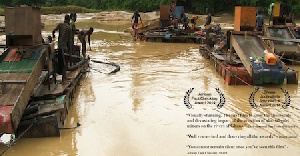Documentary specialist and journalist Edem Srem says his reason for partnering with Gifty Andoh Appiah to document the dissipating waters of the country would have been served should Ghanaians of any standing begin to act to fend of rascals polluting the various water bodies with lead, cyanide and mercury in the quest of discovering gold nuggets.
Trading Ghana’s water for gold documentary since its release has won the 2014 African Fact Checking award as well as the 2014 Ghana journalists Association award for story on the environment.
Attendees who gathered at the British Council Hall where the screening took place at times gave out sighs, exclamations and at times made pensive remarks whiles also laughing at some of the claims of interviewees in the documentary because of its sheer vividness and the disregard the alluvial miners have for the source of life (water).
The documentary which took 6 months to make sometimes at the peril of the filmmakers lives touched base in the Western, Eastern, Ashanti, Northern, Upper East and Central regions and exposed the sheer scale of the destruction perpetuated by a few people but whose actions continues to affect millions.
Mark Addo of Endeavour Mining stated that he could not hold back his rage indicating “this is not mining, this is sheer evilness”. He explained although established mining companies are often castigated for not giving back to the society they operate in, the real destruction is caused by alluvial miners also known as galamsey operators who roam freely from one district to the other perpetuating their crimes.
According to the Mr. Addo, his outfit realizes the need to empower the locals to lead decent lives explaining Endeavour Mining has built schools, business centres and empowered the locals to sustain themselves economically.
Gerald serving with Golden Star mining company observed that unless all stakeholders devise a means to regulate and contain galamsey operators such that their actions are monitored, the country risk losing clean water in the next few years.
A representative from the Australian High Commission, Kate said she was pleased and privileged to be part of the discussion of protecting Ghana’ river bodies noting that as one from a mining country the commission has already engaged stakeholders to exchange notes and experiences on ways of adopting sustainable means of mining.
Edem Srem for his part thanked brains behind the Environmental Film Festival of Accra for deciding to screen his documentary even though it was a late entry. He said at ‘Bimpoegya’, one of the miners nearly drowned the camera man adding at ‘Kyekyere’ in the Western Region in one of the enclaves, an alluvial miner drew a double edged sword to attack the crew but was tamed thanks to the plain clothed soldiers assigned to the team.
Mr. Srem added in other mining zones they had to come face to face with near death as the violent miners fired warning shots to frighten them and stop them from filming.
At the screening of the documentary, it emerged that the poor and often illiterate miners were doing the bidding of godfathers in Accra, Kumasi and Takoradi as well as others in European capitals who finance and provide the equipment and weapons they use in their work.
The Water Destroyers also known as ‘toto toto’ is said to cost anything from 8000 to 10,000 cedis and interestingly enough local artisans especially those at Suame construct the ‘toto toto’ machines with Chinese engines inserted and then the destruction beings.
Aside the Water Destroyers grinding rocks at the bottom of river bodies they expose users of such water sources to injurious sediments, the noise these Water Destroyers make can be heard kilometers away compelling professor Chris Gordon, Director of the Institute for Environment and Sanitation studies to remark that “having been to various sites of galamsey production; chiefs, opinion leaders in the towns, police personnel, teachers, doctors/nurses/health attendants and students in the towns cannot claim not to know of the operation of the alluvial miners. If courage is lacking in confronting the few, the larger society will suffer a terrible fate” he added.
Srem and Andoh Appiah’s report showed that not only are the river bodies under siege but the forests are under attack as well as the miners fell trees to make lands available for their operations.
Additional the rivers cannot support fish stock any longer because of deposits of lead, mercury and cyanide in the water.
The effect of these chemicals on the human body as made known by a medical officer in the film included damage to the kidney as well as stillbirths and deformities.
Because of the heavy pollution on-going, the water company is unable to safely filter water for consumption leading to a complete shutdown of the Kibi treatment plant in 2009.
The Pra and Ankobra rivers are on the verge of collapse if alluvial miners are not halted in their tracks.
It appears the inter-ministerial task force set up in 2013 to curtail the operations of the illegal miners has lost teeth giving the miners the confidence to surge forward with their deeds.
A common theme running through the discourse of the miners is the lack of opportunities at such places leading to high rates of unemployment, with some including the women intimating that should other viable ventures be availed to them they would stop the illegal mining.
The question then is what action has government and international organizations taken so former miners willing to put their past behind can be engaged economically?
It is absolutely clear that if the illegal miners are not co-opted into the established mining companies and land reclaimed for other purposes, the future indeed looks bleak for citizens.
General News of Friday, 12 December 2014
Source: www.ghanaweb.com
Galamsey Film Screened: “I hope Ghanaians act now to save our rivers”- Filmmaker
Entertainment












